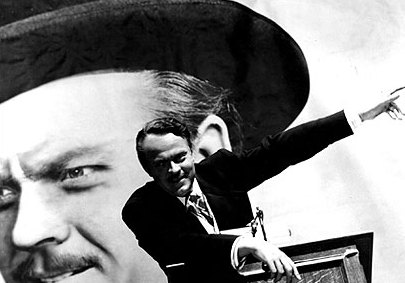CITIZEN KANE (1941) - ♦♦♦♦♦
 Directed by - Orson Welles
Directed by - Orson Welles
Written by - Herman J. Mankiewicz, Orson Welles, Roger Q. Denny, John Houseman, Mollie Kent
Starring - Orson Welles, Joseph Cotten, Dorothy Comingore, Everett Sloane, Ray Collins, George Coulouris, Agnes Moorehead, Paul Stewart, Ruth Warrick, Erskine Sanford, William Alland
"Following the death of a publishing tycoon, journalists rush to discover the meaning behind his final utterance.
Not much hasn't been said to praise Citizen Kane, that is generally regarded as the best film ever made, as well as one of the most influential and groundbreaking cinematic works of all time.
It's certainly true for many reasons and in most of the fields of filmmaking, which were almost completely new and revolutionary. For starters, there is the screenplay and overall narrative structure of the film, that at the time was highly unusual, with its effective use of a lengthy introduction chronicling the public life of the central and titular character in this film. Furthermore, the epic portrayal of the man's life has inspired many of the films that were made afterwards. Not to mention that the use of the anti-hero as the leading character in the story makes Citizen Kane all the more seductively ambiguous and compelling in a sometimes troubling way - you can still feel the boldness of the switch in viewpoint from the usual array of cinematic archetypes, and the power that came with it.
Of course, the boldness of Orson Welles for this, his first feature film and the best first feature film ever made, does not stop there. It is widely chonicled and reported that his film was gripped by controversy as for the first time, a filmmaker and ayoung one at that, dared to point fingers at the stranglehold and manipulation of the media and teh cult of personality. But in a more specific way, Welles had constructed his Charles Foster Kane around the powerful figure of William Randolph Hearst - the American newspaper publisher that built the largest newspaper chain in the country and inevitably shaped the country's popular and political culture profoundly.
As if all that wasn't inspiring enough, it is also generally accepted that this was the highest artistic achievement in thecinematic field since the advent of sound also due to the inventive and revolutionary use of photography, with its particularly meticulous mise-en-scene scene, unusual camera movements and framing and Gregg Toland's spectacular 'deep focus' cinematography, which for once had everything on screen look sharp and vivid. One can hardly emphasize enough the complete turn around it caused in the first age of talkies that had comfortasbly settles for lights and shadows but also a rather theatrical approach that accommodated sound equipment. Interesting to note hence, for those who do not know it, that Welles was of course providing a fresh outlook to the new artform after years and years of celebrated work on radio and theatre.
To top it all off, all the ingredients in this magnificent film might have overwhelmed the acting, but as afore mentioned Orson Welles coming from a theatre background himself, is phenomenal at making sure that the emotive and psychological depth of the film remain central to the film and as vivid as the photographic deep focus by getting the best performances out of the great cast mostly made up of theatrical actors that had never left a mark on the cinematic form before. Welles himself as the titular character is so cunning, dark and mysterious and his performance makes Kane's descent into darkness all the more relentless and effective - a character study like few others.
As most who have seen the film will say, it is hard to escape the gigantic legacy of this film. All it takes is to watch the vast majority of feature films to understand just how much of it on every level was initiated by Welles in this monumental, monolithic film that will most likely never seem to age.
Drama, USA
